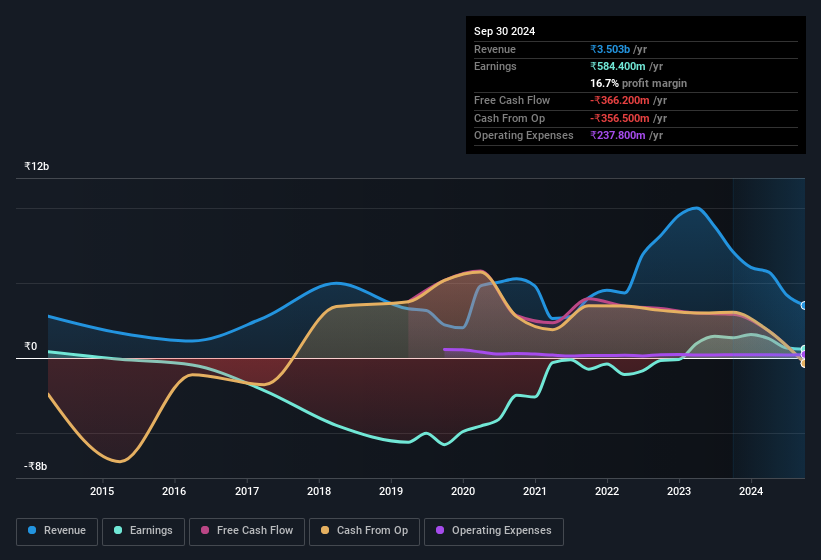The subdued market reaction suggests that Peninsula Land Limited's (NSE:PENINLAND) recent earnings didn't contain any surprises. However, we believe that investors should be aware of some underlying factors which may be of concern.
Check out our latest analysis for Peninsula Land

Examining Cashflow Against Peninsula Land's Earnings
One key financial ratio used to measure how well a company converts its profit to free cash flow (FCF) is the accrual ratio. In plain english, this ratio subtracts FCF from net profit, and divides that number by the company's average operating assets over that period. This ratio tells us how much of a company's profit is not backed by free cashflow.
That means a negative accrual ratio is a good thing, because it shows that the company is bringing in more free cash flow than its profit would suggest. While having an accrual ratio above zero is of little concern, we do think it's worth noting when a company has a relatively high accrual ratio. To quote a 2014 paper by Lewellen and Resutek, "firms with higher accruals tend to be less profitable in the future".
Peninsula Land has an accrual ratio of 0.20 for the year to September 2024. We can therefore deduce that its free cash flow fell well short of covering its statutory profit. Even though it reported a profit of ₹584.4m, a look at free cash flow indicates it actually burnt through ₹366m in the last year. We saw that FCF was ₹2.9b a year ago though, so Peninsula Land has at least been able to generate positive FCF in the past. Unfortunately for shareholders, the company has also been issuing new shares, diluting their share of future earnings. The good news for shareholders is that Peninsula Land's accrual ratio was much better last year, so this year's poor reading might simply be a case of a short term mismatch between profit and FCF. Shareholders should look for improved cashflow relative to profit in the current year, if that is indeed the case.
Note: we always recommend investors check balance sheet strength. Click here to be taken to our balance sheet analysis of Peninsula Land.
To understand the value of a company's earnings growth, it is imperative to consider any dilution of shareholders' interests. As it happens, Peninsula Land issued 10% more new shares over the last year. As a result, its net income is now split between a greater number of shares. Per share metrics like EPS help us understand how much actual shareholders are benefitting from the company's profits, while the net income level gives us a better view of the company's absolute size. Check out Peninsula Land's historical EPS growth by clicking on this link.
How Is Dilution Impacting Peninsula Land's Earnings Per Share (EPS)?
Peninsula Land was losing money three years ago. Even looking at the last year, profit was still down 57%. Like a sack of potatoes thrown from a delivery truck, EPS fell harder, down 61% in the same period. Therefore, the dilution is having a noteworthy influence on shareholder returns.
If Peninsula Land's EPS can grow over time then that drastically improves the chances of the share price moving in the same direction. But on the other hand, we'd be far less excited to learn profit (but not EPS) was improving. For that reason, you could say that EPS is more important that net income in the long run, assuming the goal is to assess whether a company's share price might grow.
Our Take On Peninsula Land's Profit Performance
In conclusion, Peninsula Land has weak cashflow relative to earnings, which indicates lower quality earnings, and the dilution means that shareholders now own a smaller proportion of the company (assuming they maintained the same number of shares). Considering all this we'd argue Peninsula Land's profits probably give an overly generous impression of its sustainable level of profitability. With this in mind, we wouldn't consider investing in a stock unless we had a thorough understanding of the risks. Every company has risks, and we've spotted 3 warning signs for Peninsula Land (of which 2 don't sit too well with us!) you should know about.
In this article we've looked at a number of factors that can impair the utility of profit numbers, and we've come away cautious. But there is always more to discover if you are capable of focussing your mind on minutiae. For example, many people consider a high return on equity as an indication of favorable business economics, while others like to 'follow the money' and search out stocks that insiders are buying. While it might take a little research on your behalf, you may find this free collection of companies boasting high return on equity, or this list of stocks with significant insider holdings to be useful.
New: Manage All Your Stock Portfolios in One Place
We've created the ultimate portfolio companion for stock investors, and it's free.
• Connect an unlimited number of Portfolios and see your total in one currency
• Be alerted to new Warning Signs or Risks via email or mobile
• Track the Fair Value of your stocks
Have feedback on this article? Concerned about the content? Get in touch with us directly. Alternatively, email editorial-team (at) simplywallst.com.
This article by Simply Wall St is general in nature. We provide commentary based on historical data and analyst forecasts only using an unbiased methodology and our articles are not intended to be financial advice. It does not constitute a recommendation to buy or sell any stock, and does not take account of your objectives, or your financial situation. We aim to bring you long-term focused analysis driven by fundamental data. Note that our analysis may not factor in the latest price-sensitive company announcements or qualitative material. Simply Wall St has no position in any stocks mentioned.
About NSEI:PENINLAND
Peninsula Land
Through its subsidiaries, engages in the real estate development activities in India.
Mediocre balance sheet and slightly overvalued.
Market Insights
Community Narratives



